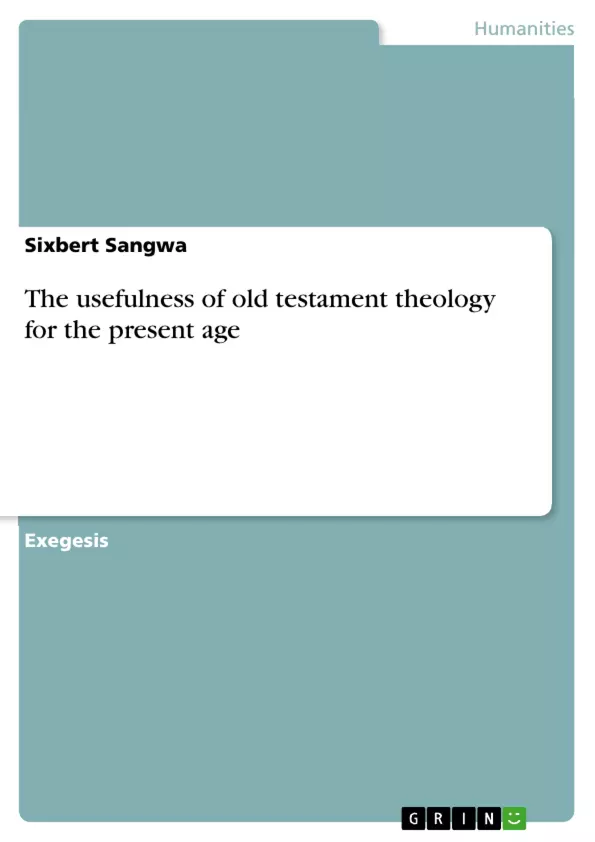This paper discusses a biblical theology of knowledge of God in the Old Testament based on two representative passages, selected because of their meanings (Judg. 2: 7, 10 and 1 Sam. 2:12).
No texts are added from the Pentateuch, because some will be cited for reference. The same happens with other texts in the prophets, since most are parallel or serve to complement the ideas developed. As will be seen, the theme is developed mainly in historical, poetic and wisdom genre on literature, in both the pre-exilic and exilic period. As we mean the same God in the Old and New Testaments, contemporary Christians can be equipped with knowledge of God through reading the Old Testament. We will try to analyse what it really means to know God and advise how a Christian can benefit from that knowledge found in the Old Testament.
Inhaltsverzeichnis (Table of Contents)
- Introduction
- Judges 2: 7, 10
- The first generation
- The second generation
- Conclusion
- 1 Samuel 2:12
- Defining knowledge of God in 1 Samuel 2:12
- The sons of Eli and the knowledge of God
- Conclusion
- Further analysis from the poetic and wisdom texts
Zielsetzung und Themenschwerpunkte (Objectives and Key Themes)
This paper delves into the biblical theology of knowledge of God in the Old Testament, analyzing two key passages from Judges and 1 Samuel. The paper examines the meaning of knowing God in these historical books and explores how this knowledge relates to the experiences of different generations of Israelites. It further investigates how the knowledge of God can be understood through the lens of other Old Testament literature, particularly in poetic and wisdom texts.
- The nature of knowing God in the Old Testament
- The importance of experiencing God's actions
- The role of obedience and service in demonstrating knowledge of God
- The consequences of neglecting God's commands
- The relevance of Old Testament theology for contemporary Christians
Zusammenfassung der Kapitel (Chapter Summaries)
The paper begins by exploring the meaning of knowing God in Judges 2:7, 10, comparing the experiences of two generations of Israelites. The first generation witnessed God's power firsthand, while the second generation had only heard about these events. The paper analyzes the reasons for this difference and the consequences of failing to experience God's power. It then examines the meaning of knowing God in 1 Samuel 2:12, using the example of Eli's sons. This passage highlights the importance of recognizing God's authority and obeying His commands in the context of priestly service. The paper concludes by exploring the concept of knowing God in other poetic and wisdom texts, specifically citing Job 18:21, which emphasizes the significance of obedience.
Schlüsselwörter (Keywords)
The key themes and concepts explored in this paper include knowledge of God, Old Testament theology, obedience, service, experience, generations, historical books, poetic and wisdom texts, contemporary Christianity, and the significance of God's actions in the lives of individuals and communities.
Frequently Asked Questions
What does it mean to "know God" in the Old Testament?
In the Old Testament, knowing God is not just intellectual knowledge but an experiential relationship involving obedience, service, and witnessing His actions.
Which biblical passages are centrally analyzed in this paper?
The paper focuses on Judges 2:7, 10 and 1 Samuel 2:12 to illustrate different generations' and individuals' knowledge of God.
What is the difference between the first and second generations in Judges?
The first generation experienced God's power firsthand, while the second generation only heard about it, leading to a decline in faithfulness and knowledge of God.
How do the sons of Eli exemplify a lack of knowledge of God?
Despite being priests, Eli's sons "did not know the Lord" because they disregarded His commands and authority in their service (1 Samuel 2:12).
Is Old Testament theology useful for modern Christians?
Yes, the paper argues that reading the Old Testament equips contemporary Christians with a deeper understanding of God's character and the importance of obedience.
What role do poetic and wisdom texts play in this study?
Texts like Job are used to complement historical accounts, showing that fearing and obeying God is a consistent theme of "knowledge" across different literary genres.
- Arbeit zitieren
- Dr. Sixbert Sangwa (Autor:in), 2021, The usefulness of old testament theology for the present age, München, GRIN Verlag, https://www.grin.com/document/1030191



